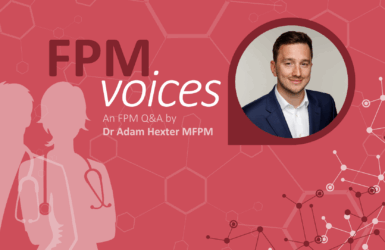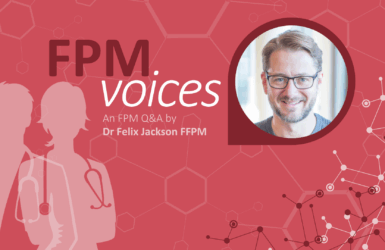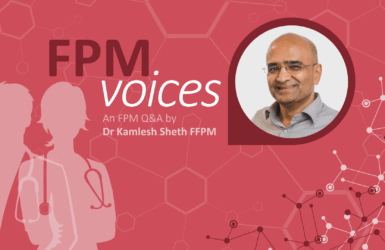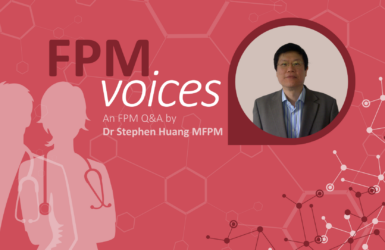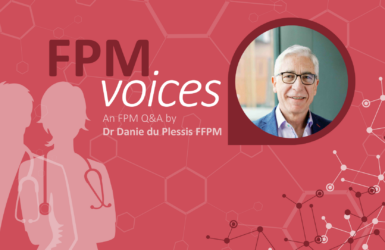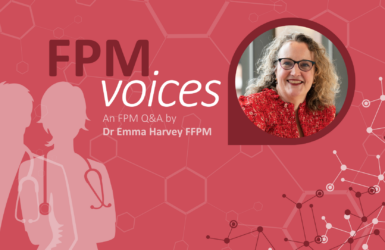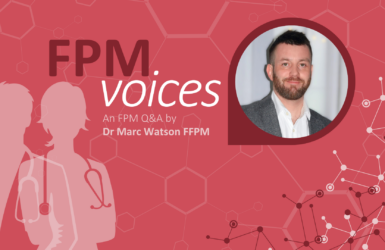Dr Chitra Kumaravel
An FPM Voices Q&A
Posted on: Wednesday 6 August 2025
Author: Dr Chitra Kumaravel
This Q&A has been prepared by Dr Chitra Kumaravel.
Chitra is a Clinical Research Physician at Parexel, working in a Phase I unit with a focus on early-phase trials. She has a particular interest in ethics, clinical trial design, and increasing representation in research. She is currently completing the Pharmaceutical Medicine Specialty Training (PMST) programme and an MSc in Clinical Pharmacology, is an expert member of the Health Research Authority, and sits on FPM’s Equality, Diversity and Inclusion (EDI) Forum.
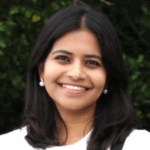

FPM Voices is a Q&A interview series that shines a spotlight on the careers and insights of senior and influential pharmaceutical physicians. Through these conversations, we aim to provide colleagues with a deeper understanding of the opportunities, challenges, and rewards of pharmaceutical medicine.
Each interview explores personal career journeys, key lessons learned, and the role that the Faculty of Pharmaceutical Medicine (FPM) has played in shaping professional growth.
What first sparked your interest in pharmaceutical medicine, and what has kept you passionate about the field?
I was first introduced to the pharmaceutical industry almost by accident. After graduating from medical school in India, I was working in intensive care. While I found it rewarding, the role was intense and left little time for anything outside of work, including preparing for PLAB (Professional and Linguistic Assessments Board). I began looking for a role that would offer more balance and flexibility, and that is when I came across a position in pharmacovigilance as a medical safety physician.
What started as a practical decision quickly became a turning point. Reviewing adverse event reports and SUSARs (Suspected Unexpected Serious Adverse Reactions) helped me realise how clinical knowledge could be used to protect patients on a much broader scale. It was structured, meaningful work, and it opened my eyes to a part of medicine I had not known existed.
After moving to the UK, I returned to intensive care during the COVID-19 pandemic. But I knew I wanted to return to the pharmaceutical world, this time with intention. Through a Facebook group of doctors exploring non-traditional career paths, I found my current role as a Clinical Research physician in a Phase I unit.
What keeps me passionate is the impact this work has behind the scenes. Each protocol I contribute to, every decision around dosing or safety, feels like a small but important step toward better treatments. Knowing that my work supports the safe and ethical development of new medicines is what gives me a strong sense of purpose and fulfilment.
What does FPM represent to you, both professionally and personally?
As soon as I moved into pharmaceutical medicine in the UK, I became a member of FPM. I had regular appraisals and was revalidated, which helped me understand the expectations and standards of the specialty. My appraiser, Dr Peter Stonier, encouraged me to consider the Pharmaceutical Medicine Specialty Training (PMST) programme, and that conversation played a key role in helping me take the next step. I enrolled shortly after.
Professionally, FPM has provided structure, direction, and a sense of identity within the field. The training pathway has supported my development and helped me feel more confident in my role.
Personally, it has felt like a professional home. Coming from a non-traditional route that included intensive care, drug safety, and a Phase I CRO (Contract Research Organisation), I was not sure where I would fit. But through FPM events and conversations, I have seen how much value is placed on varied experiences. Now, as a member of the Equality Diversity and Inclusion (EDI) Forum, I feel proud to contribute to building a more inclusive and welcoming community for others in this field.
In what ways have you helped champion FPM’s mission for the next generation of pharmaceutical physicians?
I try to share my journey openly, especially with doctors who are curious about career paths outside of traditional clinical training. Many colleagues from international backgrounds have reached out to ask how I transitioned into pharmaceutical medicine, and I am always happy to share what I have learned. I know how overwhelming it can feel at the start, and sometimes hearing a relatable story makes a real difference.
I stay active in online spaces where doctors discuss career transitions, and I try to share insights and answer questions, especially from those looking to move into pharmaceutical roles in the UK.
Since becoming part of the FPM EDI Forum, I have felt even more motivated to make pharmaceutical medicine more visible and accessible. I believe it is important that people from a range of clinical and cultural backgrounds feel welcome in this space. If I can help even one person feel that they belong here, then I see that as a meaningful contribution.
What’s a recent innovation or lesson – whether from colleagues, patients, or scientific advancements – that has inspired or changed your perspective?
Learning about the role of artificial intelligence in clinical research has changed the way I view the future of medicine. I had always thought of AI as something distant or experimental, but I have come to see how it is already being applied in practical and meaningful ways.
From protocol design to real-time safety monitoring and data review, AI is starting to support how we deliver clinical trials. It does not replace clinical judgement, but it can enhance how we detect risks, analyse patterns, and make more informed decisions.
This realisation has encouraged me to stay open to change and to think beyond the boundaries of traditional clinical practice. It reminded me that innovation is not something that happens later or elsewhere. It is already here, and it is part of the work we do every day.
Throughout your career, what has been your greatest challenge, and how do you stay resilient in the face of setbacks?
One of the greatest challenges in my career has been transitioning into the pharmaceutical industry. After working in intensive care and moving into a Phase I clinical setting, I had to adjust to a completely different way of thinking and working. There were moments when I felt unsure of myself and questioned whether I was doing enough or moving in the right direction.
Starting my MSc in Clinical Pharmacology and enrolling in the PMST programme gave me structure and helped me grow more confident in my role. At the same time, balancing my MSc, PMST requirements, and full-time responsibilities as a sub-investigator has not always been easy. I also want to be present for my family and finding that balance is something I continue to work on.
What helps me stay resilient is staying connected to why I chose this path. I find motivation in the work itself and in the knowledge that I am contributing to something meaningful. Support from my family and mentorship through my training have also played an important role. They remind me to keep perspective, stay curious, and take each challenge as part of the process of growth.
How can the field of pharmaceutical medicine advance diversity and inclusion, and what actions can individuals take to contribute to meaningful change?
Diversity and inclusion begin when people feel genuinely valued and understood. When someone enters a space and sees their experiences reflected, it builds confidence and a sense of belonging that is difficult to create through policy alone. In pharmaceutical medicine, this sense of belonging matters deeply for both professionals and the populations we aim to serve.
Inclusion should not be viewed as a checklist. It requires us to listen carefully, reflect critically, and be open to learning from different viewpoints. Whether through clinical trial design, patient engagement, or workplace culture, we need to keep asking who might be missing from the conversation and why.
Serving on the FPM EDI Forum and working as an expert member of the Health Research Authority ethics committee has helped me look at these questions more closely. I have become more aware of how decisions made during protocol development or ethics reviews can either reduce barriers or unintentionally reinforce them. It has also shown me the value of empathy and clarity in communication, especially when dealing with diverse participant populations.
Meaningful change often starts with simple actions. It might be encouraging a quieter voice in the room, questioning assumptions in a draft document, or mentoring someone who is just starting out. Each step builds a more inclusive and thoughtful community.
If you weren’t a doctor, what completely different career would you want to try?
I think I would have pursued a career as a Bharatanatyam dancer. Bharatanatyam is a classical Indian dance form, and I have been trained in it for over 20 years. It has always been a deeply personal part of my life and has shaped the way I carry myself, both professionally and personally. Through dance, I learned discipline, focus, and expression. Performing required presence and patience, which are qualities I continue to draw on in my career.
I also enjoy travelling and take great interest in planning trips. From researching destinations to creating thoughtful itineraries, I find the process both creative and satisfying. If I were not in medicine, I could see myself working in a field that helps others discover new places and cultures.
Dance and travel reflect different parts of who I am. One offers rooted tradition and discipline, the other brings freedom and exploration. Together, they remind me of the value of balance, perspective, and lifelong curiosity.
More from this series



